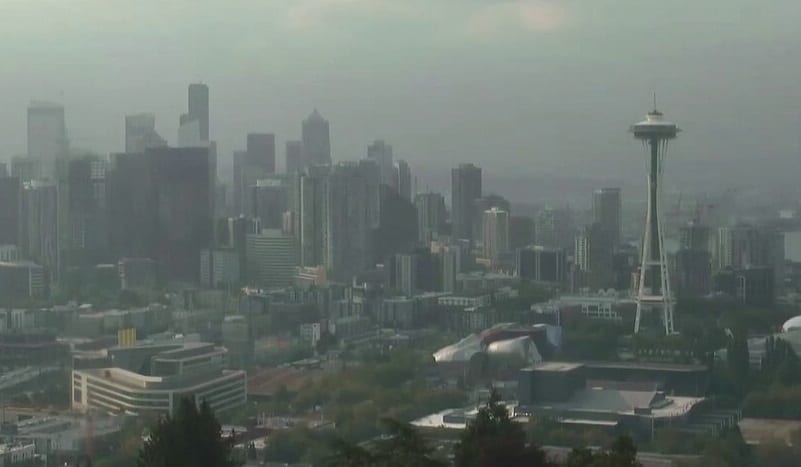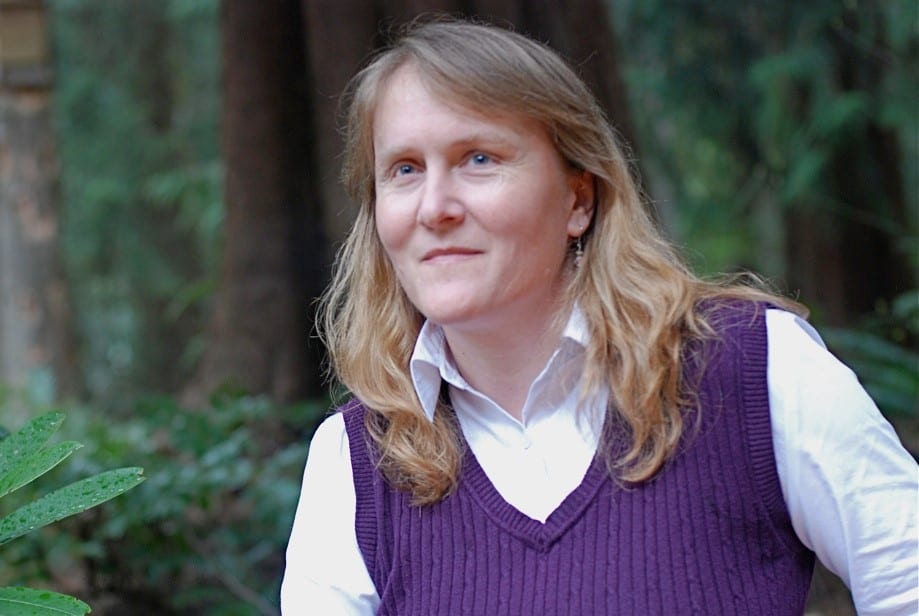
This is a guest post authored by Climate Change Research and Adaptation Advisor Ronda Strauch as part of a quarterly new series called Climate Connections.
Last year, Seattle denizens experienced multiple days in a haze of smoke. Whirling winds pulled in smoke from wildfires burning outside of Puget Sound and even as far away as Siberia. And when there was no wind, smoke settled over the area like a blanket. Only the return of Seattle’s typical westerly winds allowed the smoke to clear. Will we be smoked out in Seattle again this summer? Many factors make it seem likely.
To begin with, we had a cold, dry winter. Spring kicked off with March precipitation at 37% of normal levels and days near 80°F, matching temperatures in Tucson at the time. The official start of the 2019 Washington wildfire season began in March, a very early onset. That month, 54 wildfires ignited in Washington and all but one were west of the Cascade Mountains, according to Washington Department of Natural Resources.

This year’s weather so far has left us with a water deficit—and that means dry soils and dry forests. We are looking at a thirsty kickoff to the summer season. NOAA’s Climate Prediction Center is forecasting a warm, dry summer, consistent with a weak El Niño. The National Interagency Fire Center has issued an outlook for “above normal significant wildland fire potential” for Western Washington. Conditions are ripe for wildfire and smoke close to home, portending a possible repeat of a smoky Seattle summer.
Climate Change’s Connection to Smoke
While we can’t attribute a single smoke event to climate change, over the long-term, climate change can increase the odds of smoky conditions. As the climate continues to warm, the total area burned in Washington’s forests is estimated to increase fourfold by the 2040s. This is primarily because warming temperatures can lead to drier conditions and drier vegetation that easily ignites. These conditions will lengthen the fire season and thus, the duration of smoke production.
Declines in forest health linked to climate change can also increase the intensity of a fire, which in turn affects the chemistry, quantity and distribution of its accompanying smoke. There is uncertainty if smoke will impact Seattle, particularly coming from out of state.
Of course, there is a chance we may see no smoke this summer. Let’s hope for that.
How Smoke Affects City Light
Smoke can have numerous impacts on people and business, including City Light. Smoke leads to poor air quality, reduced visibility and damaged equipment.
Particles found in smoke make it difficult for City Light employees and contractors to breathe, particularly for those who live with asthma, chronic bronchitis or reduced lung functions. Reduced visibility due to smoke can also challenge inspections of City Light facilities, including transmission lines and dams, where clear visibility is required.
Also, here’s a little-known fact: heavy smoke can
conduct electricity. Therefore, dense smoke near a transmission line can create
a conductive path that can increase the potential for a “flashover.” Flashover
or arc flash can occur with ionization of the air as voltage jumps across air
gaps between powerlines or to the ground. Smoke is attracted to high voltages
and can build fragile carbon bridges that conduct leakage currents.
Finally, smoke can settle on equipment and lead to reduced efficiencies or
failure. A recent study of residential energy use during years with and without
smoke in Seattle found that City Light’s load during summer was better
predicted when considering air quality. This suggests that our customers might
be buying air conditioners and purifiers when they can’t open their windows
because of smoke.
City Light is Adapting
One positive effect of our recent smoky summers is that City Light now has some experience dealing with these smoke events. We have learned from them and can continue to implement adaptations to better cope with smoke. As a utility, there are actions we can take to reduce our vulnerability and prepare for the impacts of climate change.
Adaptation includes using personal protective equipment (PPE) per guidance from our Safety, Health, and Wellness Division to minimize employee exposure to smoke. We can increase flexibility in our inspections to accommodate smoke delays. The advanced education of emergency responders on needed precautions while working near electrical equipment during dense smoke provides greater capacity for handling smoky conditions.
Additional preparation includes retrofits or adjustments to equipment that might be sensitive to smoke exposure. Securing contracts from our suppliers prior to needing materials will also better prepare us for potential smoke conditions.
As the public adapts to smoke through air conditioners and purifiers, City Light prepares through our long-term planning for shifting energy demand. Proactive planning and flexibility can reduce our vulnerability and minimize risks from smoke… Kind of like having a “plan B” vacation spot this summer. (Maybe one that’s less smoky.)
Resources for More Information
Washington Department of Ecology – Smoke & Fire Management and
Washington Air Quality Advisory
Washington State Department of Health – Smoke from Fires Q&A and Toolkit (many languages)
Washington Smoke Information –blogspot

Ronda Strauch joined Seattle City Light in July 2018 as a Climate Change Research and Adaptation Advisor in the Science Policy Unit of the Environment, Land and Licensing Business Unit. She recently obtained her PhD from the University of Washington in the Department of Civil and Environmental Engineering, specializing in landslide and hydrologic modeling. When time allows, Ronda enjoys gardening, hiking, kayaking, and mountain climbing.